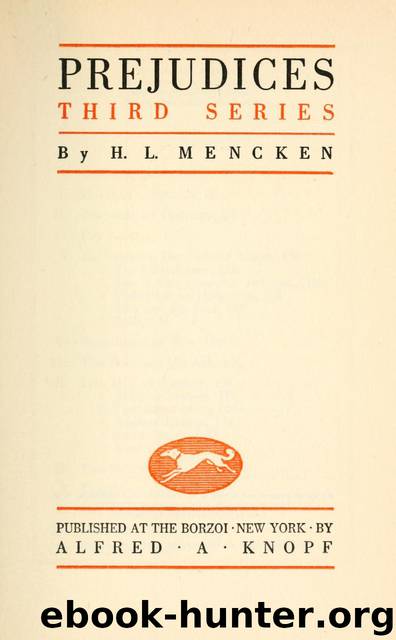Prejudices, Third Series by H. L. Mencken

Author:H. L. Mencken [Mencken, H. L. (Henry Louis)]
Language: eng
Format: epub
Published: 0101-01-01T00:00:00+00:00
I do not forget, of course, that there is a borderland in which it is hard to say, of this or that composition, whether it is prose or poetry. Lincoln's Gettysburg speech is commonly reckoned as prose, and yet I am convinced that it is quite as much poetry as the Queen Mab speech or Marlowe's mighty elegy on Helen of Troy. More, it is so read and admired by the great masses of the American people. It is an almost perfect specimen of a comforting but unsound asseveration put into rippling and hypnotizing words; done into plain English, the statements of fact in it would make even a writer of school history-books laugh. So with parts of the Declaration of Independence. No one believes seriously that they are true, but nearly everyone agrees that it would be a nice thing if they were true—and meanwhile Jefferson's eighteenth century rhetoric, by Johnson out of John Lyly's "Euphues," completes the enchantment. In the main, the test is to be found in the audience rather than in the poet. If it is naturally intelligent and in a sober and critical mood, demanding sense and proofs, then nearly all poetry becomes prose; if, on the contrary, it is congenitally maudlin, or has a few drinks aboard, or is in love, or is otherwise in a soft and believing mood, then even the worst of prose, if it has a touch of soothing sing-song in it, becomes moving poetry—for example, the diplomatic and political gospel-hymns of the late Dr. Wilson, a man constitutionally unable to reason clearly or honestly, but nevertheless one full of the burbling that caresses the ears of simple men. Most of his speeches, during the days of his divine appointment, translated into intelligible English, would have sounded as idiotic as a prose version of "The Blessed Damozel." Read by his opponents, they sounded so without the translation.
But at the extremes, of course, there are indubitable poetry and incurable prose, and the difference is not hard to distinguish. Prose is simply a form of writing in which the author intends that his statements shall be accepted as conceivably true, even when they are about imaginary persons and events; its appeal is to the fully conscious and alertly reasoning man. Poetry is a form of writing in which the author attempts to disarm reason and evoke emotion, partly by presenting images that awaken a powerful response in the subconscious and partly by the mere sough and blubber of words. Poetry is not distinguished from prose, as Prof. Dr. Lowes says in his "Convention and Revolt in Poetry," by an exclusive phraseology, but by a peculiar attitude of mind—an attitude of self-delusion, of fact-denying, of saying what isn't true. It is essentially an effort to elude the bitter facts of life, whereas prose is essentially a means of unearthing and exhibiting them. The gap is bridged by sentimental prose, which is half prose and half poetry—Lincoln's Gettysburg speech, the average sermon, the prose of an erotic novelette.
Download
This site does not store any files on its server. We only index and link to content provided by other sites. Please contact the content providers to delete copyright contents if any and email us, we'll remove relevant links or contents immediately.
4 3 2 1: A Novel by Paul Auster(12393)
The handmaid's tale by Margaret Atwood(7767)
Giovanni's Room by James Baldwin(7346)
Asking the Right Questions: A Guide to Critical Thinking by M. Neil Browne & Stuart M. Keeley(5775)
Big Magic: Creative Living Beyond Fear by Elizabeth Gilbert(5774)
Ego Is the Enemy by Ryan Holiday(5450)
The Body: A Guide for Occupants by Bill Bryson(5097)
On Writing A Memoir of the Craft by Stephen King(4944)
Ken Follett - World without end by Ken Follett(4734)
Adulting by Kelly Williams Brown(4574)
Bluets by Maggie Nelson(4559)
Eat That Frog! by Brian Tracy(4540)
Guilty Pleasures by Laurell K Hamilton(4449)
The Poetry of Pablo Neruda by Pablo Neruda(4109)
Alive: The Story of the Andes Survivors by Piers Paul Read(4033)
White Noise - A Novel by Don DeLillo(4012)
Fingerprints of the Gods by Graham Hancock(4004)
The Book of Joy by Dalai Lama(3986)
The Bookshop by Penelope Fitzgerald(3854)
